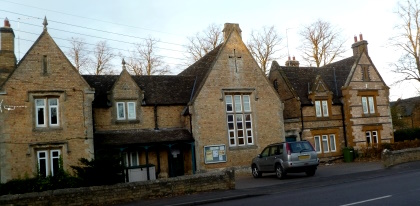|
News for the Pews |

Home

18th April 2024
ThursdayReflection
************************
'Bill Welch asks'
Faith to Move Mountains?
************************
In Mark 11, Jesus said that those with faith can move mountains.
Everyone struggles with faith from time to time, even longtime Christians.
This is part of being human.
Jesus knew this and gave encouraging words to His disciples to describe the power of faith and its impact on their lives.
Peter called Jesus' attention to when Jesus cursed the fig tree and Jesus responded, "Have faith in God"
"For assuredly, I say to you, whoever says to this mountain, 'Be removed and be cast into the sea,' and does not doubt in his heart, but believes that those things he says will be done, he will have whatever he says.
Therefore I say to you, whatever things you ask when you pray, believe that you receive them, and you will have them."
Mark 11:23-24
Jesus' use of extremes to make a point
Jesus often used extreme symbols, or hyperbole, to convey a concept.
The difficulty in understanding Mark 11 comes from Jesus' imagery of removing a mountain and casting it into the sea.
This is nearly impossible to even imagine.
If we consider this as an analogy to demonstrate that what is physically impossible for us is entirely possible for God, it becomes much easier to grasp.
The focus shifts from mountains to God, for whom nothing is impossible.
Further, when we put this discussion in the context of prayer, our thinking is transferred from the physical realm to the spiritual.
Jesus' comment in Mark 11:22 - "Have faith in God" - directs our focus toward Him and encourages us to develop a close, parent-child relationship with God.
With a submissive, childlike mind, we can take our needs directly to God as a little child would with his or her parent.
As adults, we can overcomplicate faith and lose the simplicity of direct reliance upon the One who can do things we cannot.
The real issue is confidence and developing a calm assurance that God hears our requests and will act in our eternal best interests.
Mary demonstrated this in how she made her request.
Her comment, "They have no wine," indicated one thing - she knew He would act if she made Him aware of the need.
In other words, the confidence in the action preceded the request.
We should rather have confidence that God will grant our requests, according to His will, in His time and in the manner that is best for us.
This also helps us understand why we haven't seen Christians move any mountains into the sea - because this kind of request is not a need.
Neither does submerging mountains currently align with the will of God.
God certainly has the power and ability to do it.
Jesus used the image to graphically illustrate God's power over the impossible.
Mary's faith at the wedding in Cana provides an example of how we can understand and apply Jesus Christ's instructions.
Did Mary need to move a mountain?
In a sense, yes.
There was a need that was impossible for her to fix on her own, but she believed that God could do the impossible.
She went directly to Jesus with her need, had confidence that He would act to take care of the need, and didn't doubt that He would solve it in the manner of His choosing.
Mary provides an example for us to follow as we approach God in prayer for our needs, knowing that what is impossible for us is entirely possible with God.
><(((°>
This is an edited version.
The full article and Bible references are avaiable on request
As the Church of God,
Our job - the mission Christ gave to us - is to share God's message of life, hope and truth with the world.
We don't believe that message needs to be updated or polished or reinvented for the modern age.
The words of God are as timeless and powerful today as the day they were first recorded.
Bill Welch
resides in Houston, Texas.
He has been a member of the Church of God since 1971.
He attends the Houston South congregation of the Church of God, a Worldwide Association, where he serves as a deacon.
More
Herod's Palace (Herodium)
From Wikipedia, the free encyclopedia
Herod's Palace is an archaeological site within the fortress of Herodium, West Bank, Palestine.
Herod the Great commissioned a lavish palace to be built between 23 and 15 BCE atop Herodium for all to see.
Herod used slaves to artificially raise the hill of his palace to become the highest peak in the area.
This process took years, raising the mountain one bucket of dirt at a time.
Archaeologists believe that the palace was built by slaves, paid workers (contractors), and architects.
Herod was considered one of the greatest builders of his time, and geography did not daunt him - his palace was built on the edge of the desert and was situated atop an 'artificial hill'.
The archaeological excavation of Herodium was begun in 1962 and it continued until 1967: they discovered the upper citadel, at the top of the hill.
Consider the reverse.
A mountain could be removed, bucket by bucket

Contact the Rector
The Revd.
Nic.Edwards
The Rectory,
Church Lane,
BUGBROOKE,
Northampton,
NN7 3PB
Land Line: 01604 - 815496
(Can be accessed from the mobile device)
Mobile: .....
E-mail:
thebeneficeofbhkandr at gmail dot com
Contact the Benefice Office
Sunday School Rooms, Church Lane,
BUGBROOKE, Northampton, NN7 3PB
Land Line: 01604 830373
E-mail:
thebeneficeofbhkandr at gmail dot com
Mon., Tues., Wed,, Thur., Fri.
9:00am to 11:30am

For Baptism bookings (Christenings)
to arrange an appointment please contact
the Benefice Office.
For Wedding bookings:
please contact the Benefice Office to arrange
an appointment.
Who Made This?
Seeing as you asked, if you can give helpful
advice or report factual corrections and
'deliberate mistakes',email:-
regparker3 at gmail dot com
Email addresses shown using words in an
attempt to avoid 'spam',
Type the email address replacing 'at' with '@',
and 'dot' with '.'
|



